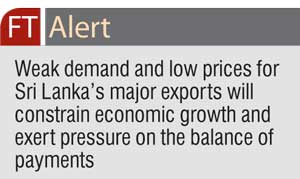Friday Feb 20, 2026
Friday Feb 20, 2026
Thursday, 31 March 2016 00:00 - - {{hitsCtrl.values.hits}}
 Sri Lanka’s economic growth is projected to recover in 2016 as private sector investment will pick up once fiscal reforms are committed to. Growth will rise further in 2017 as the global environment improves, a new Asian Development Bank (ADB) report says.
Sri Lanka’s economic growth is projected to recover in 2016 as private sector investment will pick up once fiscal reforms are committed to. Growth will rise further in 2017 as the global environment improves, a new Asian Development Bank (ADB) report says.
ADB’s flagship annual economic publication, Asian Development Outlook (ADO) 2016, forecasts Gross Domestic Product (GDP) growth to rise to 5.3% in 2016 before recovering further to 5.8% in 2017.
“Fiscal consolidation is to be put back on track by a revision of the 2016 Budget,” said Tadateru Hayashi, Senior Country Economist at ADB’s Sri Lanka Resident Mission.
“IMF support, once agreed, will protect against expected pressures from external imbalances as it builds international confidence and facilitates fiscal consolidation and tax reform.
A national development strategy will facilitate investment, both domestic and foreign.”
Inflation is expected to increase moderately under monetary tightening, picking up to 4.5% in 2016, and further to 5.0% in 2017 as growth picks up. Though domestic demand remains restrained, the depreciation of the rupee will exert upward pressure on import prices. In addition, dissipation of the base effect of several energy price cuts in 2015 will add to the upward movement in inflation in 2016.
Balance of payments will continue to be under pressure with weak exports as a result of the global slowdown and slack workers’ remittances from the Middle East affected by low oil prices. The expected renewal of GSP+ concessions from the European Union in 2016 is a positive factor for exports, with receipts from tourism also growing, following the trend since the end of the conflict. This would help maintain the current account balance at -2.0% in 2016, and see it improve to -1.8% in 2017 as exports pick up.
A low revenue ratio has been a major challenge to Sri Lanka’s fiscal consolidation process and to maintain social expenditure and public investments. A tax to GDP ratio of 12% is the lowest among the countries with a similar level of development. However, it is encouraging to note that the Government has taken steps in the right direction to enhance revenue in the proposed amendments to the 2016 Budget. The report notes that to further improve the tax system, it is necessary to strengthen policy analysis and build the capacity of decision-making agencies.